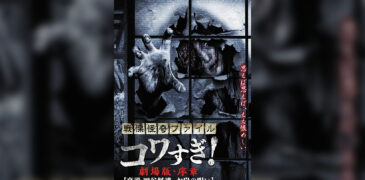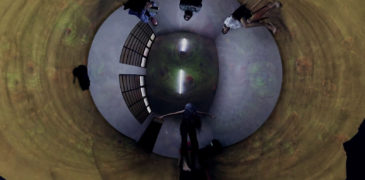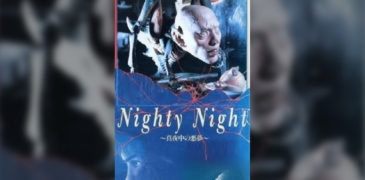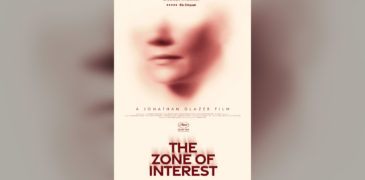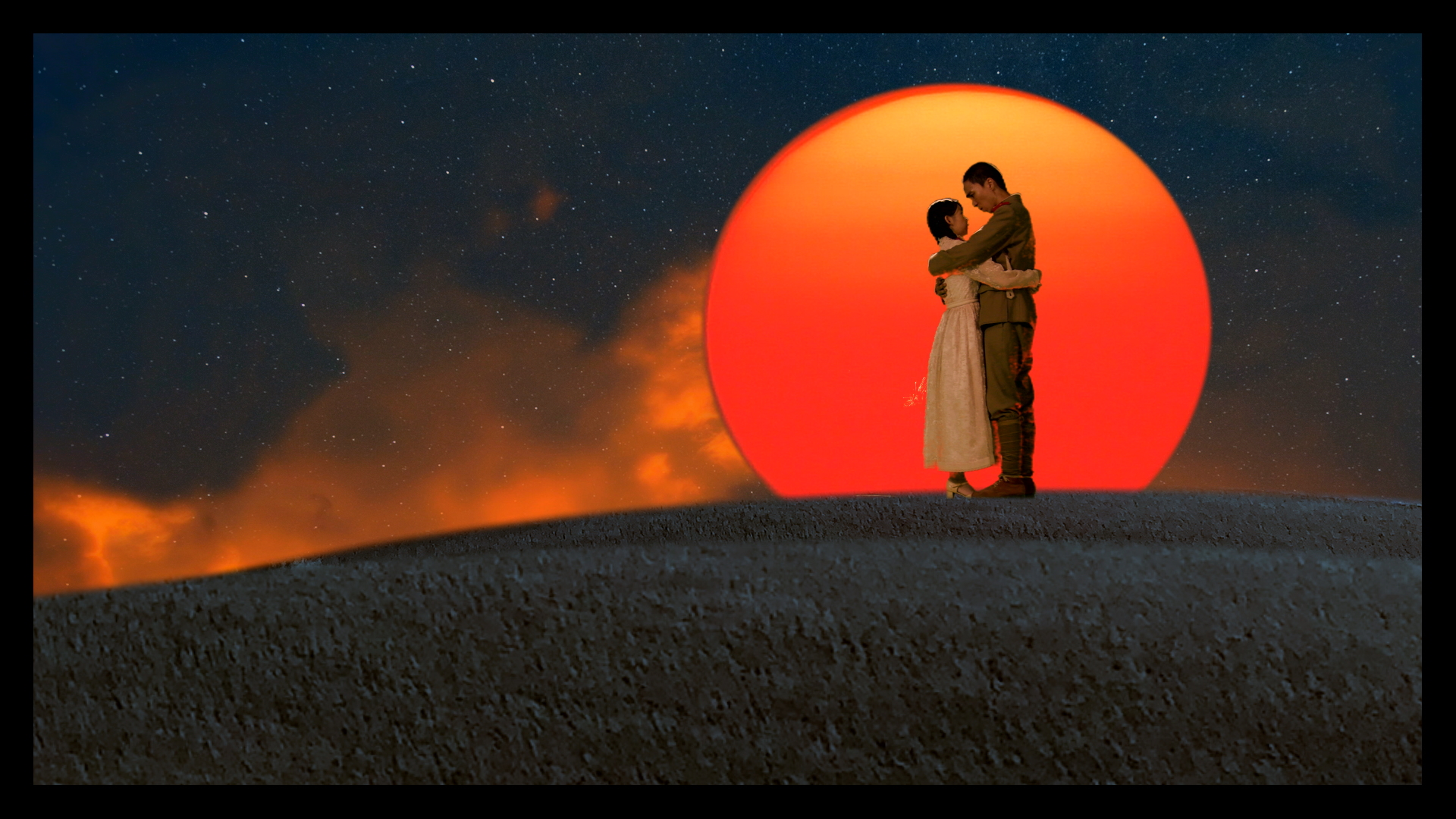
It is hard to know where to begin when discussing the epic that is Labyrinth of Cinema, the final directorial feature of Nobuhiko Obayashi. Perhaps it is best to start with the director himself. With a career spanning sixty years, Obayashi has garnered critical acclaim and an incredible cult following. From his first feature House (often affectionately referred to as Hausu) in 1977 to later efforts like the drama Casting Blossoms to the Sky from 2012, he had an incredible career that was often punctuated with unique stylistic elements: the use of dreamlike surreal imagery, a sort of comedically playful tone and often a heavy focus on anti-war themes. Horror fans will particularly take note of House, a comedy horror film that was critically panned but has gone on to gain a huge cult following for its incredible visuals.
I think these elements are important to consider because they largely define most of Obayashi’s output. If you’ve ever seen one of his films, you will likely immediately recognize another one the second you watch it. Each still sits confidently within whatever genre the story is composed around, but things like the lush visuals or that upbeat playful tone will still creep in and remind you whose work it is. Labyrinth of Cinema is true of this as well and may also stand as the most Obayashi of Obayashi’s films.
He was diagnosed with stage-4 cancer in 2016 and given only a few months to live at best. Even knowing this diagnosis, he went into production and completed Hanagatami in 2017. An award-winning film that served as something of a passion project forty years in the making. It was inspired by a novel from Kazuo Dan and Obayashi’s own childhood while also being the third and final film in a thematic series of anti-war movies. This is an incredible achievement in its own right. However, while receiving cancer treatment, he worked on and completed Labyrinth of Cinema in 2019 to serve as the final stamp on his career as a filmmaker. Obayashi passed away April 10th, 2020 at the age of 82, leaving behind an incredible and enduring cinematic legacy.
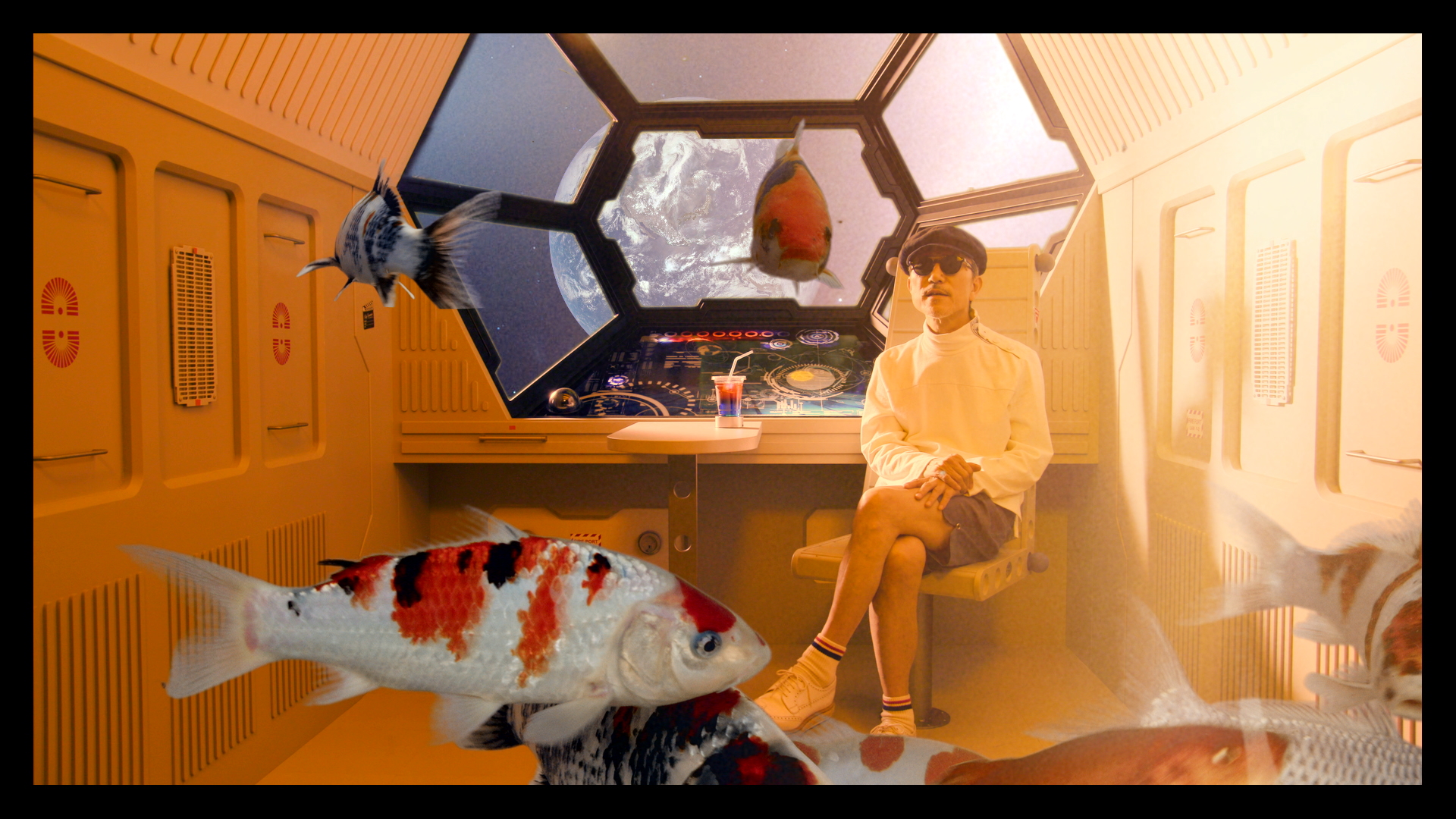
The film is set present day in the town of Onomichi. This is already a location of note within Obayashi’s works as the town where he was born and is often used as the setting for his films. Over the 80’s, he directed a series of youth dramas that have come to be known as the Onomichi trilogy. We are introduced to an ensemble cast of characters all united by one purpose: to attend a movie marathon at a local theater heralding its last day of business ahead of closing down for good. Notably, our three central leads are Mario (Takuro Atsuki), a lovable cinephile obsessed with movies and an expert at acting out his favorite moments, Hosuke (Takahito Hosoyamada), a studious bespectacled film historian, and Shigeru (Yoshihiko Hosoda), a wannabe yakuza unsure on his direction in life. Also central to the ensuing chaos is Noriko (Rei Yoshida), a childhood friend of Mario who has an equal love for cinema.
We’re also introduced to one of several semi-narrators in Fanta G (Yukihiro Takahashi), a charming older man that descends from space aboard a starship. Yes, the film opens in space with Fanta G musing about the history of humanity as absurd objects float beyond seemingly in outer space. It is just one of many quirky moments that give that surrealist vibe Obayashi is so known for. But ultimately, everyone is converging for this marathon for varying reasons. Some as cinephiles to celebrate classic films and mourn the closing of the theater while others, like Shigeru, have far more mundane reasons like just an excuse to get out of the rain. Noriko, notably, talks about how she feels that she knows so little about the world and herself and that she comes to the movies to find out such things.
As the movie marathon begins, a strange occurrence finds Noriko drawn into the theater screen and placed within the movie that’s playing. This prompts Mario, Hosuke, and Shigeru to follow along. What ensues is an incredible odyssey as the group travels through both real world and cinematic history while moving from film to film during the marathon. Things move at a breakneck pace constantly, cutting to other characters for their input or commentary and this is all supplemented with a lot of on screen text to title people or explain things. It could be overwhelming for some, but it left me with a deep feeling of immersion in what is going on. Famed poet Chuya Nakahara is referenced often and several quotes are used to set up larger ideals or transition us between the different time periods. The marathon is billed as a series of war movies, so it is within this boundary that we are able to also get a look at varying moments in history.
While the individual plots of the actual movies are somewhat standard, if not intentionally perhaps a bit derivative, what’s compelling is the characters’ reactions to their surroundings. We jump around between a jaunty musical imitating big Hollywood releases, which we’re told became a trend during post-World War II censorship, several different flavors of samurai epics, and more traditional war films covering the Russo-Japanese War and World War II. One of the most fun elements is seeing how film technique has changed as well. The first samurai film they find themselves in is cast in black and white and actually a silent film causing the gang some confusion when they realize it keeps cutting to title cards as they try to talk. There is ample use of green screen with very effective results, and it was quite charming to see them try to stick with certain visual techniques depending on the time period when each film would have been made.
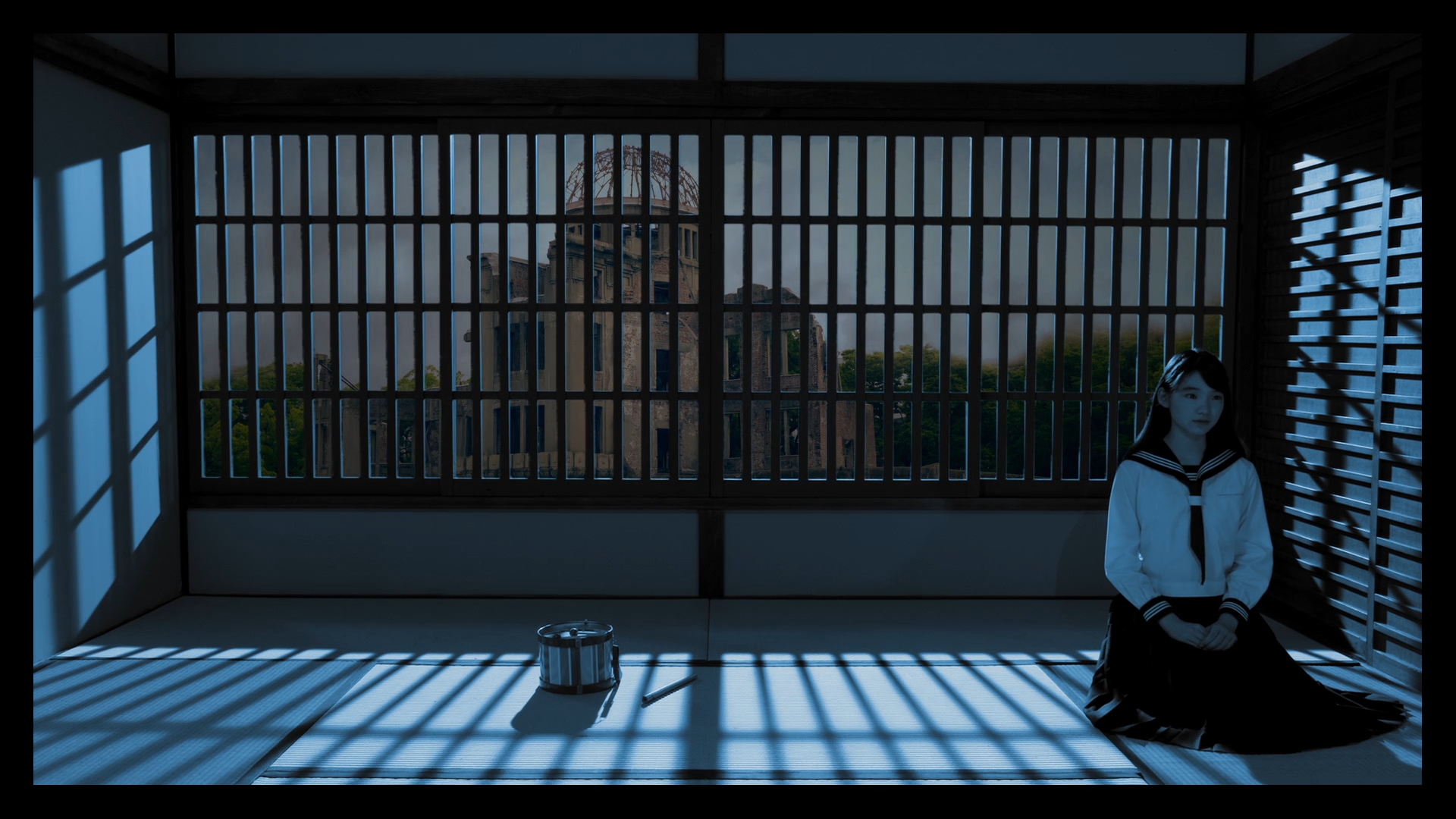
This sort of meta self-awareness is best exemplified through Mario’s nature as a diehard cinephile and it also led to some of the most fun moments for me. During one of the war movies, there’s a real “all is lost” moment as the group finds themselves locked away on suspicion of being spies awaiting their death. Just as everyone seems to be giving in to despair, Mario notes that he has realized the film’s score is starting to have an upbeat swell which heralds some sort of turnaround to their situation. It may be too sappy for some, but I was grinning ear to ear at a lot of these gags. There are far too many bits to ever detail them all out, but in short, there is a certain magic to the idea of filmmaking and throughout the experience Labyrinth of Cinema tries to celebrate that as much as possible.
I think it’s worth exploring each story on your own, but each segment roughly shares the same formula. The gang shows up, the focus shifts a bit closer on one character, and as the film’s story plays out, they invariably become involved with a love interest that leads towards some sort of tragic end. A tragic end that also illustrates the very real horrors and injustice that takes place during times of war. Obayashi’s anti-war theme is every bit as important here as the love for the wonder of movies. Even amid all the laughs and charming moments, we’re shown some very unnerving stuff and the film is very blunt about it. An idea gets floated several times that a nation wins a war by killing its own people and it is an incredibly sobering thought to consider.
Labyrinth of Cinema is a sprawling three-hour epic and yet it is also a surprisingly easy watch. The rapid fire pacing early on may overwhelm some viewers, but I felt it managed to keep me locked in and entertained. Notably, the film does slow down some after the intermission (because of course, any classic film needs one of those too) as its bombastic celebration of cinema gives way to more serious and dramatic tales. To the casual observer, it may all come off as just a bit too much as the film delights in throwing quotes from famous poets, pensive musing about both the reality of war and an overwhelming amount of references to classic film. Even as a lifelong fan of Japanese cinema, I am eager to revisit this one and pick it with a fine tooth comb for stuff that I missed.
Don’t be mistaken, however, that you need to be some sort of diehard cinephile to appreciate what’s going on. Certainly, as an avid film fan, you will be equipped to appreciate a lot of the subtler points wrapped up in Obayashi’s magnum opus. However, the central ideas are all pretty universal and easy to approach regardless of your own personal film history. Movies can be a powerful force. Just as they entertain us and allow us to indulge in a bit of fantasy, they can in equal part serve to teach us as well: about history, new ideas we may have never encountered and by acting somewhat as a mirror even lead us to discover new things about ourselves that we may have never realized before. As several characters suggest, films are lies. They give us a constructed reality that is entirely fabricated. Yet, within such lies can be couched the truth. A truth that can inspire us to change the world.
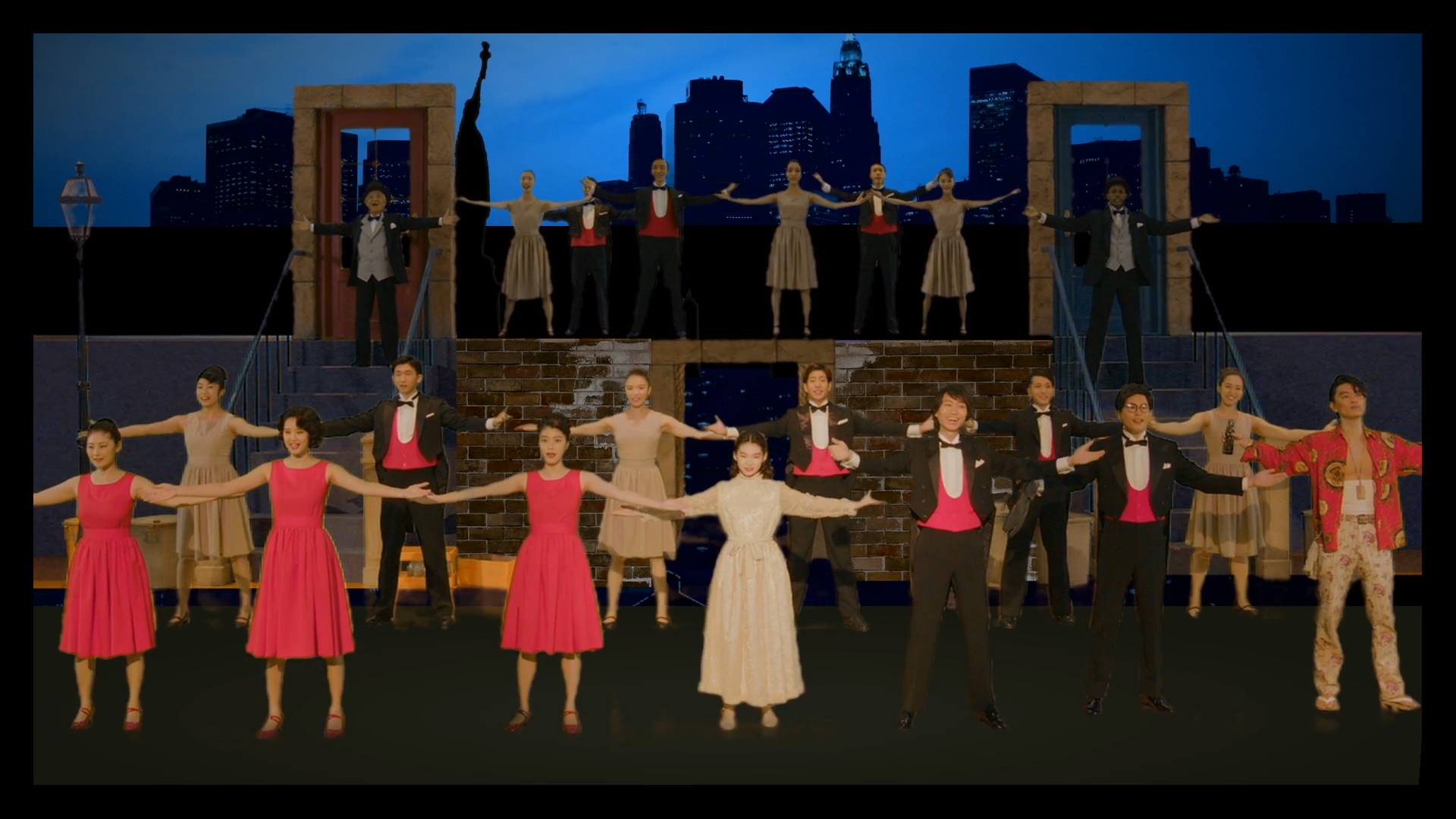
As much as Labyrinth of Cinema is a celebration of movie magic, the truth that Obayashi has presented at the center of it is a heartfelt wish for people to come together as one and create a future where things like war no longer have a place to exist. Though its message is overt, it very clearly comes from a loving and sincere place. Rightfully, the film never gets overly preachy. It never quite spells out the answer to such a big idea, instead merely suggesting that there are many different things we could turn our focus on working towards. Nobuhiko Obayashi was easily one of the greatest filmmakers of our time and I would wager that it is impossibly hard to experience this movie and not walk away feeling profoundly impacted by it.
And that’s the high praise I think it truly deserves and so much more. Labyrinth of Cinema is the perfect capstone to what will be the enduring legacy of an incredible director. A more scholarly effort could dig in with every single reference, nod, and visual cue and it likely would take a full-length book to truly break down and chronicle every moment here with ample detail. I would, in fact, love to see such a work one day. For now, I can only say that whether you’re a diehard cinephile or just a casual movie fan, Labyrinth of Cinema should be required viewing for anyone that appreciates film in any capacity. As much as it is its own powerful and moving experience, it equally and eagerly reminds us of all the reasons we love and celebrate movies the world over.
Labyrinth of Cinema is poised to start a wider theatrical run in the US following showings at The Metrograph in New York and Los Angeles’ Lumiere Cinema. There is also a limited edition all-region bluray steelbook release available from Crescendo House.

More Film Reviews
Revisiting Dreamcatcher: Bros in the Woods on an Oxy Trip
Oh, the level of alleged and legitimate prestige Dreamcatcher boasts – directed and co-scripted by Lawrence Kasdan (Body Heat) with the help of William Goldman (Marathon Man) from a novel…
Senritsu Kaiki File Kowasugi! File 05: The Ghost Of Yotsuya! (2014) Film Review – Isekai and Shiraishi’s paranormal universe!
Picking up after the vile incident of the fourth Senritsu Kaiki File, Kudo assembles his team once again to film paranormal activities and to… discover isekai? Yes, you heard that…
Ride Baby Ride (2023) Film Review
Ride Baby Ride is a tightly condensed short film that packs a powerful punch to the patriarchy in its 6 minutes. Director Sofie Somoroff is no stranger to conjuring up…
Putrefixation: A Video of Nina Temich (2022) Film Review – 360 Degrees of Horror
After purchasing a 360 camera, an aspiring filmmaker Nina Temich decides that she is going to follow her dream of being a film director. However, a trained dancer from an…
Nighty Night: Midnight Nightmares (1986) Film Review – Lost Body Horror Film
Nighty Night: Midnight Nightmares is a 1986 independent Japanese horror anthology, directed by Hirohisa Kokusho. The film was certainly unrecognized upon its initial release, receiving an extremely limited VHS run…
The Zone of Interest (2023) Film Review – A Masterful and Urgent Warning for the World
Jonathon Glazer’s latest directorial offering, The Zone of Interest (2023) is an understated, yet powerfully urgent warning of how easily humanity can be lost if we are allowed to lose…
Dustin is a potentially overqualified office worker who has a lifelong love and fascination with Japan and all things Horror. With a bachelor’s in English Literature and a master’s in Library Science, he devotes way too much time to researching and thinking critically about the media he enjoys. When not celebrating trashy horror films, anime, and idol music, he can be found raving about all things genre cinema as a co-host on Genre Exposure: A Film Podcast or indulging a passion for storytelling through tabletop roleplaying games.
